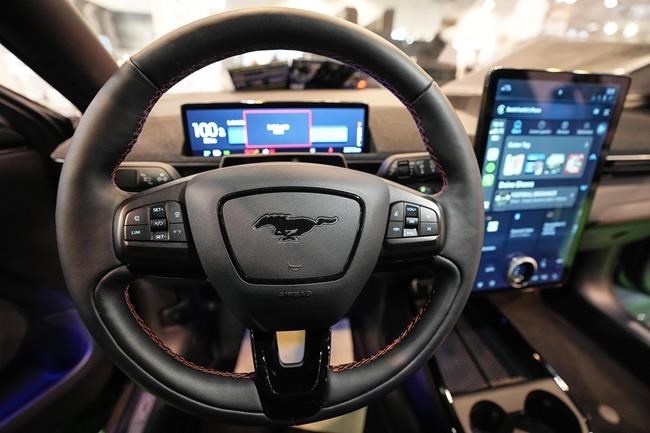TORONTO — Automakers have made high-profile price cuts for some of the most well-known electric cars this year, but experts say the overall sticker shock of buying vehicles will prove harder to remove.
As anyone who’s shopped for a vehicle as of late likely knows, prices ran up considerably throughout the COVID-19 pandemic from the dual pressures of parts shortages and inflation.
The average selling price of a new vehicle is running at about $45,500, more than 30 per cent higher than the 2019 average, according to a recent Scotiabank report. Meanwhile, Black Book data shows that the average price for used vehicles at dealerships jumped from $24,000 at the start of 2021 to peaking at almost $38,000 last summer, and has so far retreated slightly to around $36,500.
The cuts, however, are related to more specific factors in the electric vehicle market as competition increases, said Sam Fiorani, vice president of global vehicle forecasting at AutoForecast Solutions LLC.
“There are a lot of players who have all jumped in at the same time ... And now we're looking to transition from early adopters to regular consumers who don't want to pay above list for a vehicle that would replace their internal combustion machine.”
The Tesla cut put its lowest tier model just under the $55,000 cutoff for Canadian federal buyer incentives, while the Ford cuts put its lowest model under the threshold for U.S. incentives (though still about $10,000 clear of the Canadian limit).
Big price cuts aren’t likely in the offering any time soon though for gas-powered vehicles because manufacturers are still just chipping away at the parts shortages that first emerged in 2020 during the COVID-19 pandemic, and automakers are still focusing what parts they do have on their more expensive and profitable models, said Fiorani.
“On the internal combustion engine side there's very little competition on price. Every manufacturer is trying to get every dollar they can, loading up dealers with as expensive a product as they can get on the line.”
Rather than any rapid shift, there will likely be a gradual easing of the pressure as inventories build up, he said. Dealers in the U.S. have about 30 days of inventory, with roughly similar amounts in Canada, while buyers will have more negotiating power when it gets to 40 or 50 days, he said.
Those inventories have been building about five per cent month over month for the past year as production slowly improves. North American auto production, which softened in the tail end of last year but still grew by close to 10 per cent from a year earlier, is expected to grow by another seven per cent to reach 15.2 million units this year, according to Wards Automotive Group. That still puts it well below the 16.2 million units produced in 2019.
While prices should ease as inventories build, rising interest rates and overall inflation pressure will still make car buying a challenge this year, said Rebekah Young, head of inclusion and resilience economics at Scotiabank.
“We expect prices to stop going sky-high with more supply, but still to have affordability challenges.”
Prices will likely ease, in part as automakers produce more of the cheaper models they’ve been neglecting, but only to a point as some long-term shifts take hold such as higher metal and energy prices, as well as higher labour costs as workforces age, she said.
“There are legitimate cost pressures that the industry is facing,” said Young. “The push cost side of vehicle inflation is likely to be there longer.”
Automakers are also spending heavily on investments in EVs, while some are also taking price cuts to push sales. Tesla Inc. first announced big price cuts in January and Ford Motor Co. followed suit shortly after. Tesla made cuts across its four models by amounts varying between $5,000 and $15,000, while Ford cut its Mustang Mach-E by between $4,750 and $8,500, depending on the trim.
Young said she doesn't expect much more in the line of these cuts to make EVs more affordable, but that more production of cheaper models will.
“I think what we will likely see is not necessarily kind of a swath of price drops on current models as much as more models at more affordable ranges.”
She expects affordability to improve closer to the end of the year as auto loan interest rates, which were running at over seven per cent late last year, will likely be lower.
Those higher rates, along with inflation costs, have already helped push loan delinquencies up, though they're still below pre-pandemic levels according to Equifax Canada's latest report out in December.
The combination of larger loans, falling used car prices, higher borrowing costs and overall cost of living pressures are however expected to lead to a jump in people struggling to pay auto loans ahead, said CI–°¿∂ ”∆µ analyst Paul Holden in a recent report.
“We reasonably should expect significantly higher auto loan losses," he wrote.
The pressure on loan repayments will depend especially on what happens with the job market, said Fiorani, which so far has defied expectations with continued strength but that could shift downward as the higher interest rates fully take hold.
“If we start seeing unemployment rates rising, we’ve got to expect defaults on what are extraordinarily expensive loans.”
This report by The Canadian Press was first published Feb. 8, 2023.
Ian Bickis, The Canadian Press




